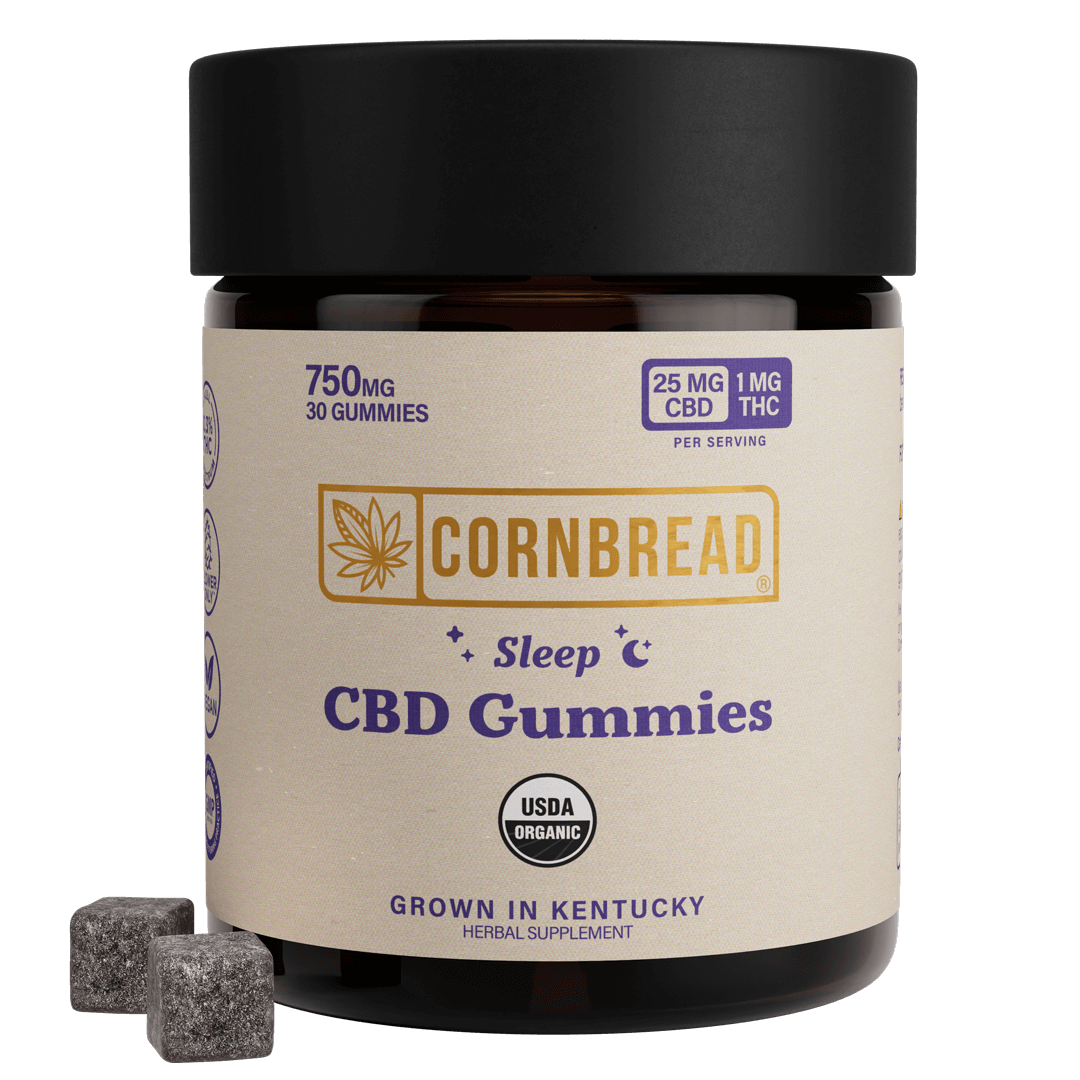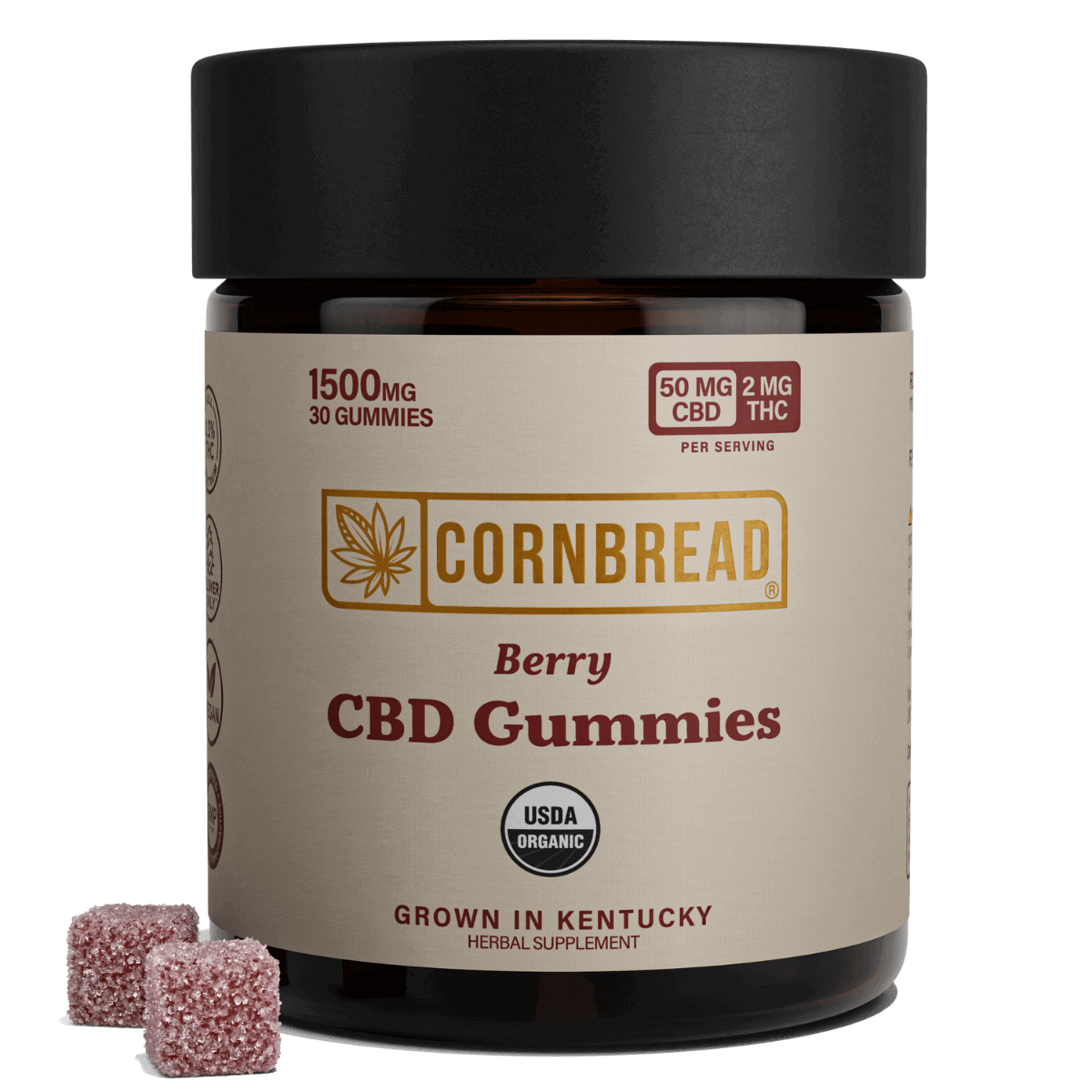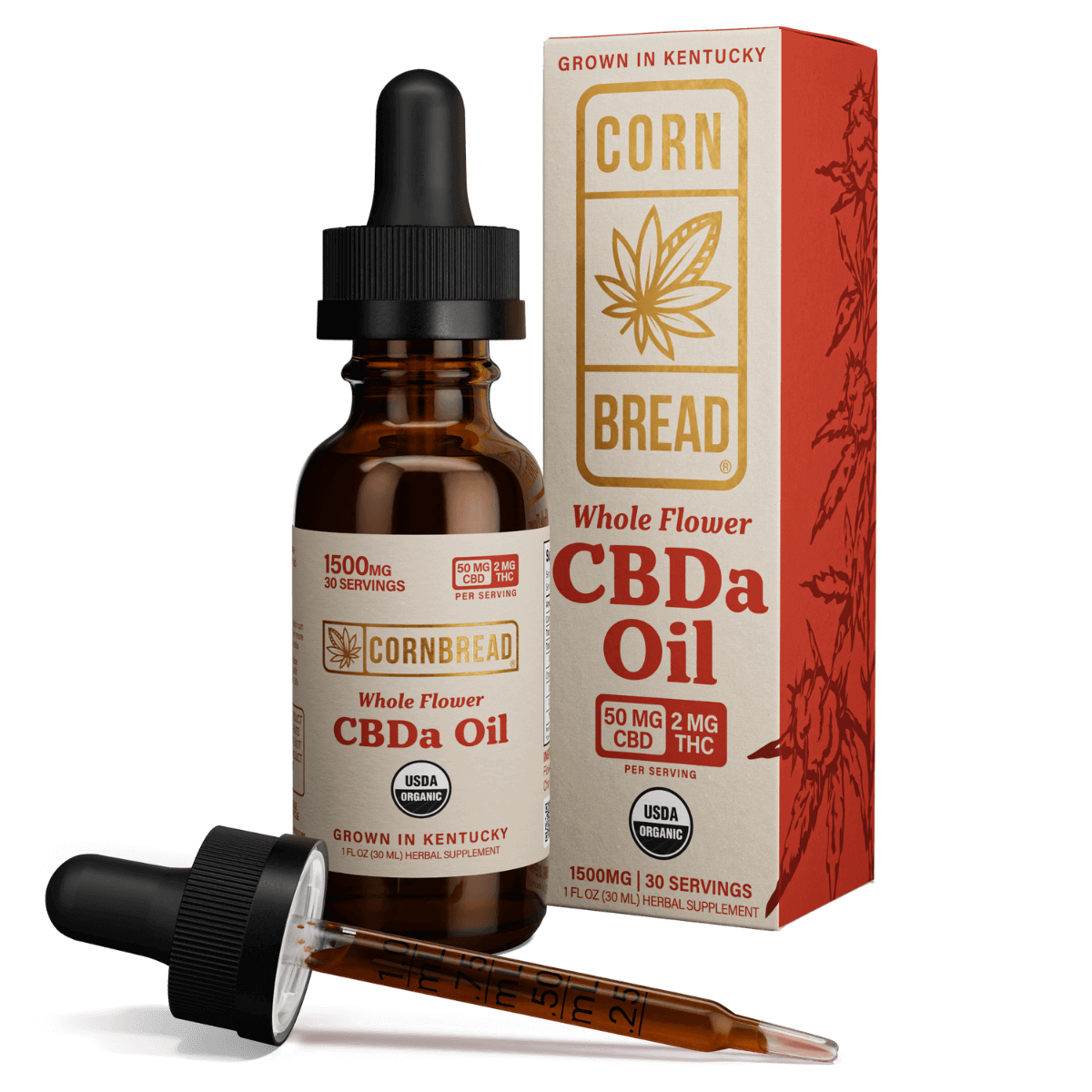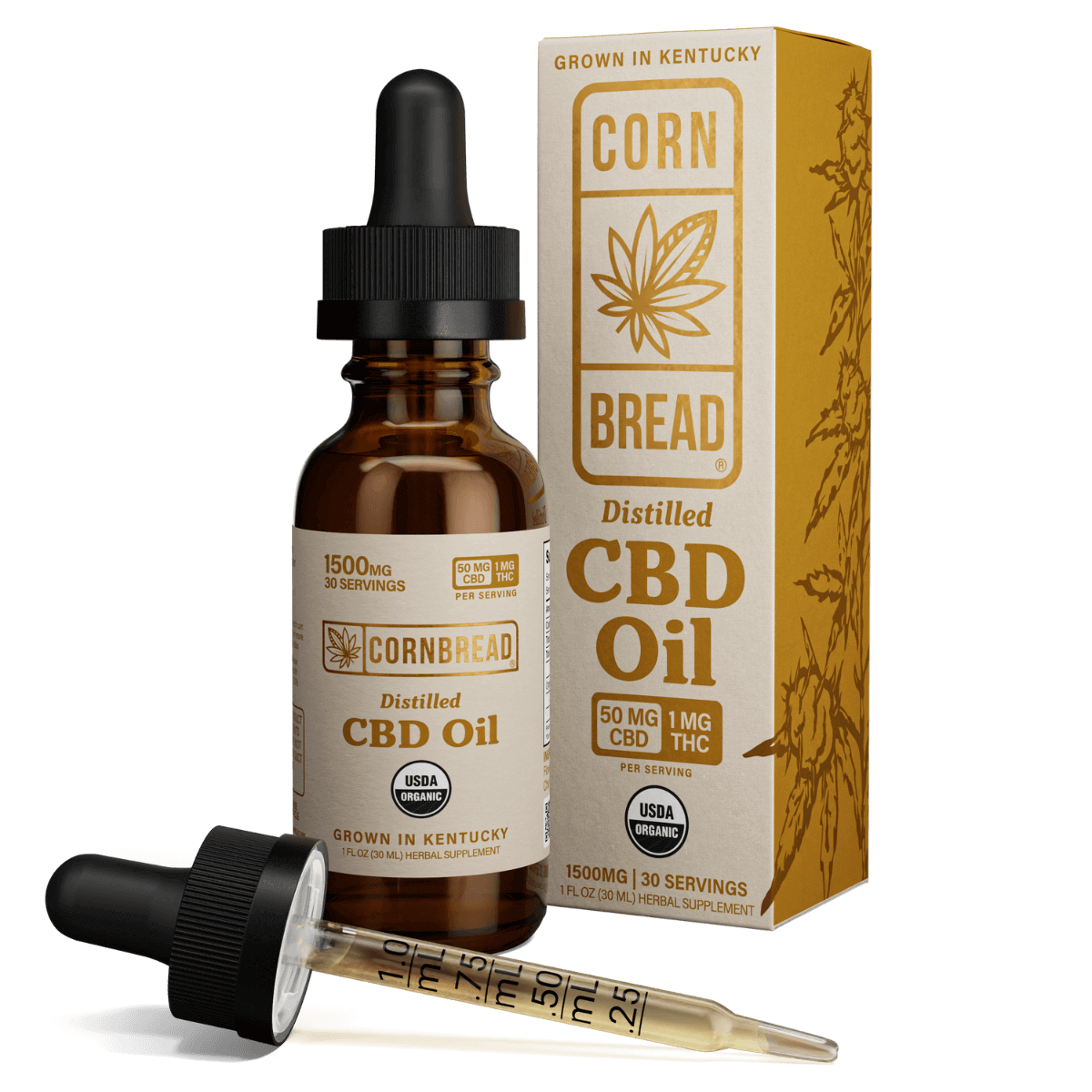Table of Contents
- Introduction
- What Is CBD?
- Liver Function Explained
- How Does CBD Affect Your Liver?
- How Does Liver Damage Occur?
- Is Too Much CBD Bad For Your Liver?
- How To Avoid Liver Damage From CBD Oil
- Organic Full Spectrum CBD Oil from Cornbread Hemp
Introduction
Cannabidiol (or CBD as it's commonly called) has become increasingly popular thanks to the many beneficial effects it produces. If you haven't experienced CBD yourself, you likely have friends or family who have sung its praises. While some online sources present CBD as a totally safe and effective solution to myriad problems, other sources warn about CBD's potential side effects — specifically CBD oil side effects on liver.
So, which is it? Is CBD safe for liver function or can CBD harm your liver? In this article, we'll take a close look at CBD, the liver, how the two interact, and whether liver damage is something you should worry about when taking CBD.
What Is CBD?

CBD is a special compound — or cannabinoid — found naturally in cannabis sativa plants. Both the hemp and marijuana varieties of cannabis contain CBD, as well as tetrahydrocannabinol (THC), and another 100+ distinct cannabinoids.
CBD and THC are the most well-known of these substances and, while they're both cannabinoids, they produce very different effects.
-
THC is the main cannabinoid present in marijuana. It's known to produce psychoactive effects when ingested or inhaled, resulting in a "high feeling," and other possible side effects (e.g., paranoia, increased hunger and cravings, and distorted perceptions). THC is primarily used recreationally, but patients with certain conditions will use THC to treat nausea or pain.
-
CBD is the most prevalent cannabinoid in hemp, and it doesn't produce a "high" effect, paranoia, or the munchies. CBD is commonly included in daily wellness routines as a health supplement to address a variety of issues, including sleep, mood, and stress.
CBD Health Benefits
While CBD is in no way a cure-all, it does offer a relatively wide range of beneficial effects.
-
CBD supports healthy sleep patterns.
-
CBD improves mood.
-
CBD relieves everyday stress.
-
CBD alleviates occasional aches and pains, such as from exercise-induced inflammation.
These things — mood, sleep, stress, aches and pains — aren't exactly related, so how does CBD affect this variety of issues? It all depends on its interaction with the endocannabinoid system, which we’ll cover in the next section.
How Does CBD Work?
The way CBD is able to produce these different positive effects is through its interaction with the endocannabinoid system (ECS), which is a complex messaging system within the body.
The EVS plays an important role in helping to regulate a multitude of functions — from digestion and immune response, to body temperature and emotional processing — but its main function is to maintain an overall balance (aka homeostasis) in the body. In short, the ECS is pretty darn important.
The ECS is comprised of three main elements:
-
Cannabinoid receptors are located on the surface of various types of cells all throughout the body.
-
Endocannabinoids are cannabinoids produced within the body that bind with receptors to produce certain physiological effects. ("Endo-" comes from a Greek word meaning "inner" or "within.")
-
Enzymes in the ECS are special proteins that break down endocannabinoids and cannabinoid-like compounds after they've performed their functions in the ECS.
Phytocannabinoids (cannabinoids from plants, like cannabis) are so similar in structure to endocannabinoids that they're also able to bind to ECS receptors. However, CBD has its own special way of interacting with the ECS. Instead of binding to receptors, CBD prevents the ECS enzymes from breaking down other cannabinoids, thus allowing them to produce even greater effects within the endocannabinoid system. This might explain why CBD has such a wide variety of therapeutic properties.
Liver Function Explained
Located in the upper right-side of the abdomen is the liver. This cone-shaped organ weighs about three pounds and, simply put, it controls chemical levels within the blood and removes harmful substances from the blood. The liver is actually involved in over 500 vital functions, but there isn't time or space in this article to address them all. Here are a few things the liver does that you should know about:
-
Produces bile which helps transport waste and break down dietary fats
-
Regulates blood clotting
-
Removes bacteria from the blood
-
Removes bilirubin from the blood (bilirubin is a yellow-colored byproduct of broken-down red blood cells)
-
Converts extra blood sugar (glucose) into glycogen (a "storage" form of glucose) to be used for energy at a later time
-
Breaks down drugs, alcohol, and and other harmful substances using liver enzymes, transforming them into water-soluble compounds for easy elimination
In addition to these critical functions of the liver, there are hundreds more, and it's easy to see how crucial it is to protect the health of this vital organ.1
How Does CBD Affect Your Liver?
With regard to CBD and the liver, CBD is metabolized and broken down in the liver, like most ingested substances.
Is CBD Bad for Your Liver?
According to the World Health Organization (WHO), CBD in its pure form doesn't appear to cause harm or show abuse potential.2
However, studies suggest that very high doses of CBD may cause liver injury to those with certain preexisting conditions, or when taken in conjunction with other substances known to adversely affect the liver. We're talking very high doses here, and later we'll get into exactly how much is too much CBD.
How Does Liver Damage Occur?
Various factors can contribute to liver damage (liver toxicity). Over time, damage can lead to scarring (cirrhosis), which could result in life-threatening liver failure. If given the chance with early treatment, it's possible for a damaged liver to heal.
Causes of Liver Damage
-
Infection (hepatitis A, B, or C)
-
Autoimmune disorders
-
Genetic abnormalities
-
Cancers affecting the liver or bile duct
-
Long-term alcohol abuse
-
Non-alcoholic fatty liver disease
-
Certain medications and herbal compounds3
For the sake of this article, we'll be focusing on the last cause, which is officially called drug-induced liver injury, or DILI.
Drug-Induced Liver Injury
Drug-induced liver injury (DILI) is when the liver becomes damaged after the use of a medication or herbal compound. There are two basic types of DILI:
-
Intrinsic Drug-Induced Liver Damage: This type of DILI is predictable and reproducible. The analgesic drug acetaminophen is the most common cause of intrinsic DILI, but tetracycline (an antibiotic), aspirin, and vitamin A (in high doses) can also result in liver injury. As these are known causes of intrinsic DILI, there are specific guidelines and warnings regarding the use of these substances.
-
Idiosyncratic Drug-Induced Liver Damage: This type of DILI is less predictable and cannot be reproduced. It's known to occur in susceptible patients, typically independent of the drug dose, and researchers believe that drug, host, and environmental factors play a large part in determining whether or not idiosyncratic DILI will develop. The condition has a variable latency (time between original injury and the appearance of symptoms) that generally starts one to two weeks after the drug or herbal supplement is first ingested.
Causes include antibiotics, nonsteroidal anti-inflammatory drugs (NSAIDs, like ibuprofen), herbal and dietary supplements, cardiovascular drugs, central nervous system agents, and antineoplastic drugs (chemotherapy).4
So, how do we know when something is wrong with the liver? One of the first indicators is an elevation of liver enzymes present in the bloodstream.
Liver Enzyme Elevations
Liver enzymes (LEs) are special proteins located in the liver that work to metabolize and break down certain substances, transforming them into less harmful forms. There are enzymes that convert glucose to glycogen (as mentioned above) in order to control blood sugar, and others that convert drugs and poisons to safer and more easily eliminated byproducts.
Certain conditions and factors can put you at risk for elevated liver enzymes. These include:
-
Hepatitis (or exposure to hepatitis)
-
Diabetes
-
A history of liver disease in your family
-
Alcohol use
Most of the time, people whose LEs are elevated won't even have symptoms. However, if liver damage is the cause, the following symptoms may occur:
-
Dark urine
-
Pain in the abdomen
-
Fatigue
-
Jaundice (yellowing of the eyes or skin due to a build-up of bilirubin)
-
Loss of appetite
-
Itching
-
Nausea and vomiting
-
Light colored excrement (poop)5
Damaged or inflamed liver cells will leak higher than normal amounts of LEs into the bloodstream. Most of the time, elevation of liver enzymes is only mild and temporary, and it doesn't usually indicate a serious liver problem. However, highly elevated enzymes often do indicate liver trouble.6
Is Too Much CBD Bad For Your Liver?
When taken as recommended, CBD doesn't appear to cause adverse effects to the liver. However, as mentioned earlier, extremely high doses of CBD could potentially contribute to liver damage.
According to a recent systematic review of 28 studies (including 12 randomized controlled trials), a connection was found between high doses of CBD and elevated liver enzymes (LEs) and drug-induced liver injury (DILI). However, it's important to note that we're talking about high doses of CBD.
In these 28 studies, 1,533 of the participants were taking CBD and 494 were on a placebo.
-
Sixteen of the studies involved either children, adults, or a mix of children and adults with seizure disorders.
-
Two involved adults with neurodegenerative disorders.
-
Two involved children with developmental disorders.
-
Two involved adults with inflammatory bowel disease (IBD).
-
Six involved healthy adult participants.
The following observations were made regarding CBD use:
-
10.5% of participants using CBD experienced elevated LEs compared to a 0.4% of those on placebo.
-
4.43% of participants on CBD developed DILI compared to 0.2% of placebo participants.
-
None of the participants (taking placebo or CBD) developed severe DILI.
Liver enzyme elevation and drug-induced liver damage were observed across a range of populations — adults and children, those with preexisting disorders, and healthy individuals. It's clear that the CBD group had much higher odds of having elevated LEs and DILI, but it’s important to note how much CBD they were taking (a lot) and other potential factors at play.
CBD, Prescription Drugs, and Liver Function
It's important to note that the majority of participants mentioned above who experienced elevated liver enzymes were also taking other over-the-counter or prescription medications at the time of the study.
-
In 76% of liver enzyme elevation cases, participants were also on the antiepileptic drug valproic acid (VPA).
-
At least 42% of DILI cases were also on VPA.
-
At least 12% of DILI participants were on the antiepileptic drug clobazam.
-
Three of the trials allowed participants to take acetaminophen concurrently.
-
There was one case of DILI where the participant wasn't taking any other medications; however, additional drug use wasn't reported in every study.
Very High Doses of CBD
In addition to concurrent prescription medications, another crucial factor to note is the amount of CBD that was being taken by participants who experienced liver enzyme (LE) elevations and/or drug-induced liver injury (DILI).
-
In 77% of cases with elevated LEs, participants were taking very high doses of CBD — 1,000 or more milligrams per day (or 9 mgs or more per pound of body weight, per day).
-
89% of CBD participants who developed DILI were also taking high levels of CBD, as mentioned above.
To put it into perspective — 1,000 mg per day is 40 times the recommended starting daily dose of CBD. Forty times!
Drug-induced liver damage was rare at lower doses of CBD and only two cases were reported in healthy adults at a dose of 300 mg per day (12 times the typical starting dose), and three cases in epileptic children at a dose of about 2.26 mg per pound of body weight per day (about 68 mg for a 30 pound child).
And there were no reported cases of elevated LEs or DILI at CBD doses below 300 mg per day.7
How To Avoid Liver Damage From CBD Oil

From the study above, it's clear that extremely high doses of CBD taken alongside other medications can bring about drug-induced liver injury (DILI). Among those participants who developed DILI, not one case was deemed severe.
If you want to start taking CBD to assist with daily stress, sleep issues, or occasional aches and pains but are concerned that it may affect your liver, that's understandable.
While most people have no reason to worry, there are still things you can do to minimize risk to your liver while maximizing your potential health benefits from CBD.
-
Consult with a healthcare professional before starting CBD if you’re currently suffering from liver issues or have a family history of liver disease, or if you’re taking any prescription medications.
-
Only purchase organic CBD oil to avoid potential harmful contaminants like heavy metals and pesticides, which can compromise liver health.
-
Only use CBD oil that has been tested by a third-party. Third-party testing is done to verify the exact cannabinoid content (how much CBD is actually in the oil) of a product and to confirm the absence of toxic contaminants. These results are officially presented in a certificate of analysis (COA). A reputable CBD company will always make their COAs available for their customers to review, often right on the website.
-
Begin with the recommended starting dose of 25 mg per day. Everyone is different and it's possible you'll need more to get the full benefits, but it's important to start slowly. There's a particular way to increase your CBD dose so that you end up with just the right daily amount for your particular needs, but start with 25 mg per day.
-
Increase your CBD dose gradually. It takes time for CBD to build up in your system and begin to have a noticeable effect. While some people may experience benefits soon after starting their CBD regimen, it can take two weeks or longer for most. After two weeks, if you feel like you need more CBD, increase your dose by a little bit. Then stay at your new dose for at least a week before increasing again. If ever you feel that you're taking too much, decrease accordingly.
-
Avoid extremely high doses of CBD. According to the studies referenced above, daily doses of 1,000 mg or more were associated with liver enzyme elevations and drug-induced liver injury. These were much less likely at doses of 300 mg per day, and zero cases were reported for even lower daily doses. If you think higher doses of CBD would be beneficial to you, be sure to consult with a healthcare professional first.
Taking the Right Kind of CBD Oil
In addition to organic and non-organic, there are three main types of CBD oil available on the market and it's important to understand what makes each one unique.
Full Spectrum CBD
Full spectrum CBD oil contains a variety of cannabinoids and other cannabis compounds. These work together synergistically to maximize the benefits of CBD. This phenomenon is dubbed the "entourage effect" and is why full spectrum is considered to be the most effective type of CBD. The amount of THC found in full spectrum products is no more than 0.3%, enough to contribute to the entourage effect, but not enough to make you feel high.
Broad Spectrum CBD
Broad spectrum CBD oil is similar to full spectrum in that it also contains various cannabis compounds. The big difference is that broad spectrum products don't contain THC. Broad spectrum CBD may still bring about some degree of the entourage effect and is preferred by those who are trying to avoid THC. Broad spectrum products can definitely produce many positive effects, although they likely won't be as great as with a full spectrum CBD.
CBD Isolate
CBD isolate is pure CBD without any other cannabinoids or cannabis compounds. It can be combined with a carrier oil (e.g., coconut or hemp seed oil) to make CBD oil. CBD oil made with CBD isolate has some potential benefits, although it likely won't be as effective as either broad or full spectrum CBD oils due to its inability to bring about the entourage effect.
Organic Full Spectrum CBD Oil from Cornbread Hemp

At Cornbread Hemp, we understand the importance of knowing exactly what you're getting in a wellness supplement. That's why we're dedicated to providing high-quality, pure, and safe cannabidiol (CBD) products that you can rely on for maximum benefits. Our full spectrum CBD oil is made from Flower-Only™ extract and is USDA certified organic at every stage.
All of our products (from the CBD gummies to the CBD oils and tinctures) undergo rigorous third-party lab testing, with certificates of analysis made available online, so you can see exactly what each CBD product contains. Shop now to experience the benefits of full spectrum CBD oil.












 Log in
Log in



















